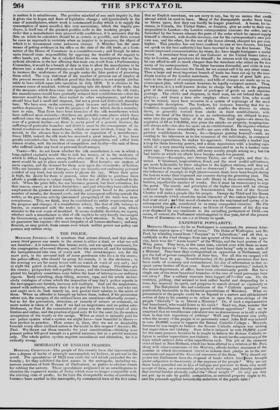1M510RALITY OF ENGLISH TRADERS.
MORNING CHRONICLE—The people of this country have slid imperceptibly, into a degree of laxity of principle unexampled, we believe, at present in the world. The speculations of 1825 tore aside the veil which concealed the de- formity; for they exhibited the first names in the metropolis, including nu- merous members of both Houses of Parliament, as parties to obvious frauds for robbing the unwary. These speculations originated in an unwillingness to abandon the expensive modes of living which were no longer compatible with the existing state of profits. So far have the disreputable modes of conducting business been carried in this metropolis, by commercial men of the first name that an English merchant, we are sorry to say, has by no means that credit abroad which he used to have. Many of the disreputable modes have been so blown upon, that they can hardly be longer practised. A house, for in- stance, in Canada, the United States, or Jamaica, give an order to their cots respondent in London—the London correspondent executes the order, and is furnished by the houses whence the parts of the order which he cannot supply himself is obtained, with double invoices, one for the correspondent's own pri- vate use, and the other, for the use of the house abroad, charged ten per cent. higher. This practice has not been confined to one or two houses, but (and we speak on the best authority) has been resorted to by the first houses. The recent improved communications by steam, &c. have taught foreigners a useful lesson. A merchant from one of our Colonies or the United States takes a trip to London, and purchases for himself ; he returns with his cargo, which he can afford to sell so much cheaper than the merchant who relied on the hos nesty of his correspondent. The latter becomes distrustful, and visits in turn this country, and discovers the fraud, for we cannot call it by any other name. Thus a large and most important branch of trade has been cut up by the inor. dinate avarice of the London merchants. The same want of good faith pre. veils in the disposal of consignments ; and bills of charges are made Up on an extravagant plan, which cannot, however, be legally excepted against. Thus, for inteance, it is a well-known device to charge the whole, or the greatest part of the carriage, of a number of packages of goods on each separate package. The clerks and shopmen, in their turn, are not behind their ems ployers ; and hence a man who employs others under him, who would not be ruined, must have recourse to a system of espionage of the most disagreeable description. The bankers, for instance, knowing that the in- formation respecting coach parcels, which enables the thieves to obtain them, is generally derived from clerks in their establishment, with whom the head of the thieves is on an understanding, are obliged to exa- mine into the private habits of the clerks. The thief again—we mean the capitalist of 60 or 1(10,0001., who plans the attacks on property, keeping him- self always safe—has also his spies on an establishment. He inquires whether any of these dress remarkably well—are seen with fine women, keep ex- pensive establishments, horses, &c.—frequent gaming houses?—and, ac. cording to his inferences as to the resources of the individuals, as compared with their expenditure, he makes his approach. Occasionally a banker lays a trap for these knowing gentry, and a sham negotiation with a leading capi. talist, of a very amusing nature, was communicated to us by a banker some years ago. There are, no doubt, still many worthy people among us ; but the bad habits to which we allude have become much too general.
• STANDARD—Examples, says Jeremy Taylor, are of weight, and they de. scend. If falsehood, tergiversation, fraud, and the most sordid self-interest, are made fashionable by their adoption in the highest stations, will they not be followed in the next highest, and so downward ? Do men want proofs of
the influence of example in high places—more duels have been fought during the last six weeks than disgraced our country during the preceding year. The number of deaths (murders the ,law calls 'them) in these encounters, has, we believe, equalled the number of weeks. But it must be unnecessary to urge the point. The morals and principles of the higher classes will be always reflected by their inferiors. An Administration like that of the Second Charles will make a people like his people. George the Third and his Queen set an example which raised the moral character of this nation higher than it
had ever stood ; and that moral character was the nutriment and spring of its subsequent stret gth, manifested in so many unequalled victories. Mr. Pitt was a strictly pule a id honest man ; no House of Commons of his day was ever disgraced by any similitude to the swindling parliament of 1826—we mean, of course, the Parliament whichexpired in that year, forlof the present House of ;Commons we are not at liberty to speak.


















 Previous page
Previous page